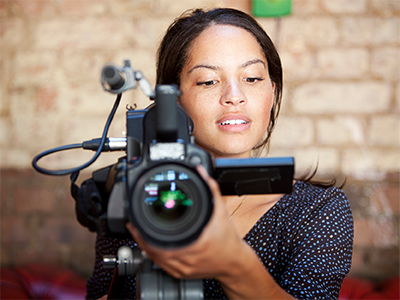The Role of Lawful Videography in Depositions and Trials
Lawful videography has actually arised as an important tool in both depositions and tests, offering a diverse method to documenting witness statements. As lawful professionals progressively identify its value, it triggers a deeper evaluation of just how these visual documents can affect juror understandings and test end results.

Importance of Legal Videography
Lawful videography plays an essential role in the paperwork and presentation of depositions and tests. This customized field integrates technical skills with lawful expertise to create a trusted record of process that can dramatically affect situation end results. The appearance of lawful videography boosts the understanding of witness testament, allowing jurors and judges to observe not just the talked words but likewise the disposition, feelings, and body movement of the witnesses.
Additionally, legal videography offers an objective account of events, minimizing the potential for misinterpretation that can happen with created transcripts alone. This aesthetic documents offers as an important tool during test presentations, helping with a clearer and even more convincing narrative for both complainants and accuseds. Additionally, the ability to replay video clip sections throughout court process allows legal groups to highlight vital points, enhancing their disagreements properly.
The relevance of legal videography extends past the court; it additionally plays a crucial duty in protecting proof for future recommendation, whether for charms or more legal activity. Its combination into the legal process is vital for ensuring a fair and precise depiction of the facts, inevitably adding to the search of justice.

Process of Legal Videography
While catching the nuances of depositions and tests, the process of legal videography involves several crucial steps that make sure high-quality, exact recordings. Initially, a professional legal videographer prepares by reviewing the instance materials and understanding the certain requirements of the deposition or trial. This preparation includes familiarizing themselves with the individuals and the context, which assists in catching essential details.
On the day of the recording, the videographer sets up the needed equipment, which commonly consists of high-def video cameras, microphones, and proper lights. Making certain optimal angles and sound quality is essential, as it directly impacts the performance of the recording. The videographer interacts with lawyers and participants to establish protocols, guaranteeing that everyone comprehends the recording process.
Throughout the deposition or trial, the videographer meticulously tapes the process, paying very close attention to both verbal and non-verbal signs. This includes capturing the demeanor and responses of witnesses and attorneys. After the session wraps up, the videographer might edit the video footage for clarity and compliance with legal criteria, generating a final product that accurately mirrors the proceedings for future reference and use in legal contexts.
Benefits in Depositions
The incorporation of videography in depositions uses numerous benefits that improve the total procedure of gathering proof. One main benefit is the ability to record witness statements with aesthetic and acoustic integrity, giving an extra precise depiction of the witness's attitude, tone, and body language. This multidimensional technique permits lawyers and courts to examine reputation better than conventional written transcripts alone.
Additionally, videographed depositions serve as an effective device for maintaining testament. Must a witness become not available for test, their taped Home Page deposition can be played in court, guaranteeing that their evidence remains obtainable and pertinent. This aspect dramatically decreases the risk of losing essential info that could impact case outcomes.

Lastly, videography enhances the general professionalism of the deposition procedure, instilling self-confidence in clients regarding the thoroughness of their legal representation (legal videography). By leveraging technology, lawful professionals can significantly enhance the performance of depositions
Effect On Tests
In many trials, the integration of videography can significantly influence the discussion of evidence and the court's assumption. Lawful videography records witness testaments and essential evidence in a dynamic style, allowing click for info jurors to engage with the material on several degrees. This aesthetic component enhances the narration element of a test, providing context and psychological resonance that typical text-based evidence may do not have.
Moreover, video recordings can serve as effective devices for impeachment throughout interrogation. When discrepancies develop between a witness's prior declarations and their courtroom testimony, video evidence gives an objective reference that can sway jurors' point of views. This immediacy and quality can boost the credibility of an event's story while at the same time weakening opposing disagreements.

Future Trends in Legal Videography
As we look toward the future of legal videography, numerous arising trends promise to reshape its role within the courtroom. One considerable fad is the combination of fabricated intelligence (AI) in video clip analysis and editing. AI can enhance the procedure of recognizing essential moments in videotaped depositions, permitting lawyers to quickly access appropriate web content, therefore improving efficiency in case preparation.
Additionally, the surge of virtual truth (VIRTUAL REALITY) and boosted truth (AR) innovations is expected to transform just how jurors experience evidence. legal videography. By immersing jurors in a simulated setting, these modern technologies can supply a much more profound understanding of intricate circumstances, causing more informed deliberations
Additionally, the raising demand for remote depositions, sped up by the COVID-19 pandemic, will likely proceed. Legal videographers will certainly need to adjust to new software application and platforms to guarantee premium recordings in digital directory settings.
Last but not least, the growing emphasis on data security will certainly require more stringent procedures for keeping and sharing video clip evidence. As the lawful landscape advances, lawful videographers have to stay abreast of these fads to keep their significance and efficiency in the judicial procedure.
Conclusion
In recap, legal videography serves an important function in the judicial procedure, boosting the honesty of depositions and tests. By catching the nuances of witness testaments, this tool not just preserves vital evidence yet likewise help in providing details successfully to jurors. The value of aesthetic paperwork in examining reliability and helping with cross-examination can not be overstated. As innovation remains to progress, lawful videography is positioned to more transform its duty within the lawful landscape.